Sinclaire Interview: Torn in Two
After a series of musical projects together, vocalist Michael Cross, drummer Lachlan McDonald, guitarist Aiden Turner and keyboardist Jake Sheath find their niche as Sinclaire. The four piece’s second single ‘Torn in Two’ steers them into a direction engulfed with indie, pop and rockier elements. The track explores the all-consuming thoughts of comparing yourself with those around you and the consequences of letting validation define you. Lead singer Michael gives us his insight on the track, sharing how it aligns with the tropes on their upcoming EP, ‘Now I’m Ready to Start’.
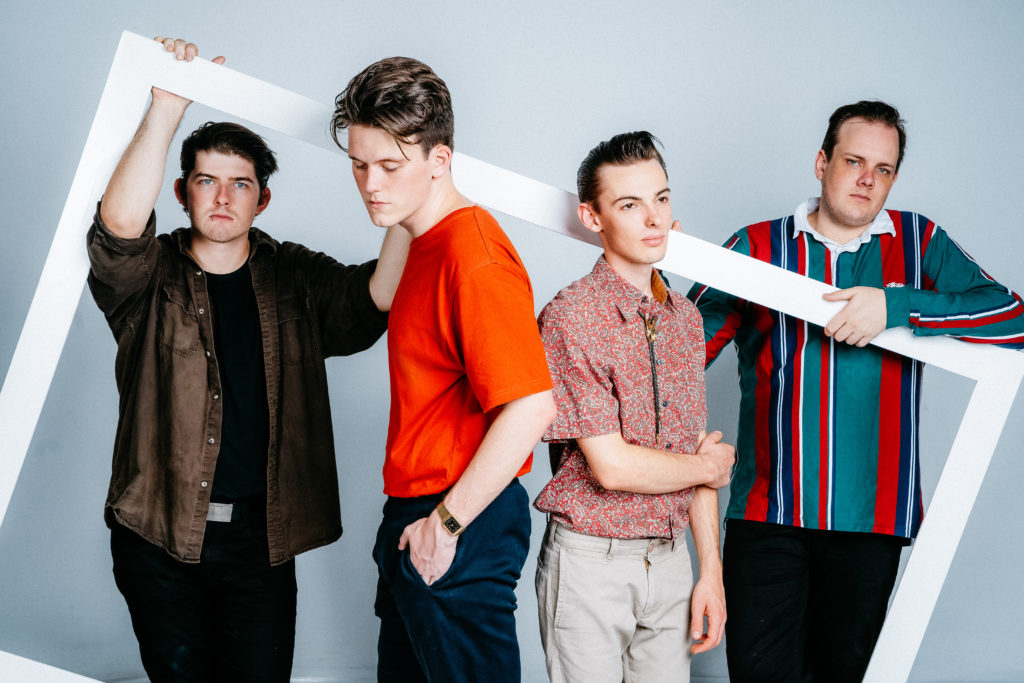
The phone conversation with Michael begins with a brief introduction as he takes me into his world as a videographer. Michael’s career choice is a fitting one; giving him a balance between his creative ambitions.
What’s it like being a creative and being involved in music? How do you take from your experience as a videographer in Sinclaire?
I think… I’m a photographer, videographer and graphic designer, so I think they all kind of blend together for me in that sense. I think it all blurs into Sinclaire as well. Having Sinclaire as a creative outlet, but also having the visual aspect as a creative outlet makes both sides better. It gives me a perspective… for example, music videos or any artwork or design we have going through the band, I’m able to see a vision and see both sides to the end. I don’t have to hand over anything. With the video, I was really involved with it with our director who produced it, Kieran from Crystal Arrow. It’s a really good way to be involved in the whole process.
Do the other band members have a similar creative background? Is music their only creative outlet?
I think for some of them, yes, music is their only creative outlet. Maybe in more obscure ways [they have other creative backgrounds]. Jake, our synth player studies electrical engineering and he loves old, analogue machines and loves to fix things. He’s really creative in terms of making his own amps and speakers and he finds his own creative outlet in that way. Lachie, our drummer is an audio engineer and he records and produces bands. I think we all have different creative outlets that isn’t just Sinclaire. It’s kind of a balance and I’m lucky enough that my job is really open about the band and lets me pursue it as much as I want to.
You’ve made music together in previous bands, is that correct?
Yes, correct.
Is Sinclaire the furthest you’ve come in completing a body of work and getting to the EP stage?
Three of us used to be in a band together before this band and we used to tour. We had two EP’s and a decent single that was just out. Essentially, there just came a point where we weren’t interested in the genre. We used to be in a pop punk band and we just grew past [it], particularly me because I didn’t grow up on those bands. All the other guys grew up on Sum 41 and Blink 182 and that was their passion. I just joined it because I wanted to be in a band. I think it showed with our song-writing because for me, to write, lyrically was a hard thing to do.
When we started recording for what was meant to be the next project, it became evident, when we were writing with a producer, he was like ‘you’re not writing your songs, you’re leaning towards a different direction’, and he pushed us towards where we’ve ended up. Towards the end of the recording process, I asked Jake, who’s our synth player, and my cousin, ‘you play keyboard, yeah?’ and he said yeah and basically just joined the band. That’s how we became the band we are today.
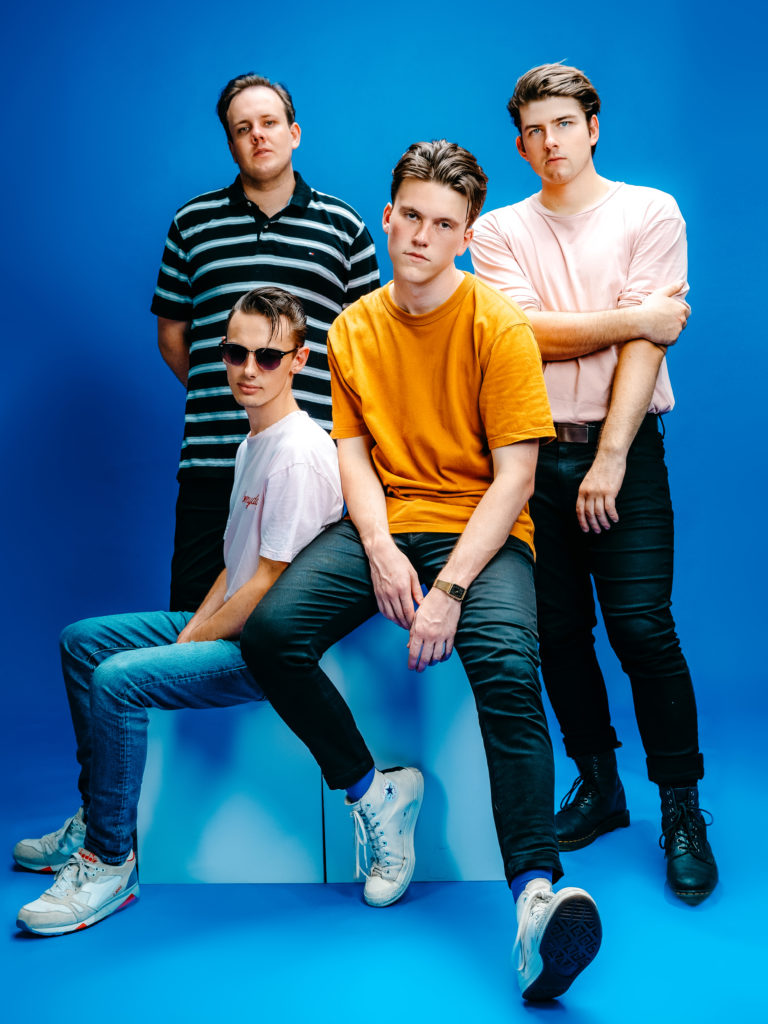
And do you think the fresh start opened the floodgates for you, creativity wise?
Yeah, 100%. I think particularly for me. We were doing those last two singles in the last band and I think that was my last hurrah kind of thing. In my head I was already prepared to do those songs and that would be it. I wasn’t interested, and when I found out that the band was keen to move in a different direction and kind of leave it behind, the band became my priority at that point. We actually locked in a day a week for ten weeks where we wrote with Stevie Knight, our producer at Electric Sun [studios].
Every week we were coming up and we would have a new song. Stevie was like ‘you just gotta to stop writing new songs’, because we would have all these ideas and be so fresh to it. It was kind of a release and it was like ‘we have this idea, we’ve got to write it’. It was a good thing in the end because we had songs to pick from and I think it made the EP better overall.
And so, ‘Torn in Two’, was that guided by Stevie also?
Yeah, so, basically the writing process for all the songs came from us going away and we would come up with a chord progression and a vocal melody for a verse or chorus. We would just jam it on acoustic guitar. It was an acoustic guitar and me and Stevie would play it and say, ‘this works. This is really good, or this is really bad’. He would be very straight up and have no bias. Essentially that was the whole song-writing process. We would have the base idea and he would guide it, [saying], ‘you should do this, or you should do that’.
At the end of the day, I think we worked really well together because he understood where we wanted to go. I think for Stevie, particularly, he is known for working with pop-punk and heavy bands, but he wants to break the Triple J mark. I’m not saying that those bands don’t break it, but he wants to make bands like Violet Soho and Holy Holy and these big Triple J bands at the moment. I think it made this really good, fresh energy where we were both really motivated to work. It was a really interesting environment.
The tracks arrangement is reminiscent of Panic! At The Disco’s style, and is amplified through their spin on indie, Triple J musical elements.
Was it challenging at all to take Stevie’s advice when blending genres? Were there any difficulties with four members and a producer all giving their advice on one project?
I think it was weird because me personally, I’d never written any songs in that genre. I’d never written an indie-rock song, but I’d listened to heaps of it. Something kind of felt natural at that point. I think when I was writing the songs before this band, I would always be leaning away from it. To finally get the chance to be able to write a song that isn’t pop-punk helped a lot. I think in my vocal style, my voice is naturally quite low, and pop-punk tends to lean itself towards high strain, like Brendon Urie. I was forcing myself to sing that way and once I finally accepted the fact that my voice was low and actually sounded good low, in my natural register it became a lot more natural. Even the song-writing felt easier.
It was never really a challenge, and Stevie wouldn’t push us that way. He knew we didn’t want to write like that anymore and, if anything he would push us away from it. Particularly when we were writing harmonies or melodies or something, he would be like ‘that’s a very pop-punk tendency, the way you’re doing that. We should rethink it’. We actually worked with another guy, Dave, who works at Electric Sun too [and does] vocals. He helped a lot too. He’s a bit older than Stevie and the rest of our band and he’s got that background of listening to songs from the 80’s. He really knew how to nail the sound we wanted to go for.
Michael’s increased grasp in song-writing is pertinent in ‘Torn in Two’. He pens lyrics that are an intense, raw projection of his emotions and mindset.
Can you talk about constructing the lyrics? Does it bring you back into a negative train of thought or rather, control and contain the emotions?
I don’t think I ever looked at it as if I was reliving it. This whole EP, every song has a different motif in the sense that I’m singing about things that happened recently. I’m using it as a way to move forward. The EP is called ‘Now I’m Ready to Start’ and I look at it as a way of [being like] ‘This is what happened’, and being as open as I possibly could in those songs was a release. ‘Headspace’ in particular was talking about how I was very critical of myself and that’s one of the things I’ve tried to work on.
Particularly with writing for this new band. I would show people the songs and be like ‘ah yeah it’s alright’ and people would say ‘this is really good, you should be really proud of this’. It’s something as a person, I’ve always found difficult. With ‘Torn in Two’, it’s a similar vibe. I’m always comparing myself to other people and it ties in with ‘Headspace’ because I would always think that nothing that I’m doing is good enough. No matter what I would do, like, I would play casual sport with a friend and feel like I had to be the best at it. It was just a way to let go and try move past it. I guess just personal progression, and to me, being as raw and open as I could be was the way to do it.
Can you talk about picking out the name, ‘Torn in Two’?
I took it as, we see ourselves as so insignificant compared to others, but at the end of the day we’re all equal and one and the same.
I think the lyrics can be taken a few ways and I show a lot of people the song and they look at it like it was a relationship thing, as in two people are torn apart. That’s the beauty of songs, anyone can take them the way they want. I think the angle you take is pretty correct. When we had the initial lyrics, they were ‘we’re red and blue’. We changed it because I didn’t like the lyric in the sense that it felt a bit cringey.
Torn in Two was an easy way to show the same metaphor. And, like you said, there’s another lyric in there ‘at the point before dying, we’re all just waiting for an end’. It’s very morbid, but it’s showing that at the end of the day, we’re all the same person. There’s no point comparing yourself because there’s no point being, like me detaching myself from a normal person’s perspective and not having that messed up mindset. That was it, I was Torn in Two from the general population and in this mindset that I put myself into.
There’s a balance in the lyricism between individuals standing as equals, juxtaposed with how we never view ourselves in the same calibre we view others. The band also strike another balance with each of the instruments and the synths, with all of them being equally as paramount in giving life to the song.
How did that play into the message of the song?
With this song, and with ‘Headspace’, both of them have a different style to the other 3 songs. They’re quite open and stripped back. With ‘Torn in Two’, I wrote the main guitar riff on acoustic guitar in my house and the synth all kind of came after that. I think it made it easy for us to slot the synth in where it needed to be. Basically, we ended up using the guitar. It became the synth when Jake joined the band later.
As the main chord progression goes, it’s all an electric piano sound. I don’t think it was really intentionally lined up with the lyrics to have that balance. We always try to give every instrument in every song its own space. We didn’t just want to have layers for the sake of having layers. We wanted every part to have its own point. It’s just a natural way of writing songs, and I see how it balances similarly to the lyrics.
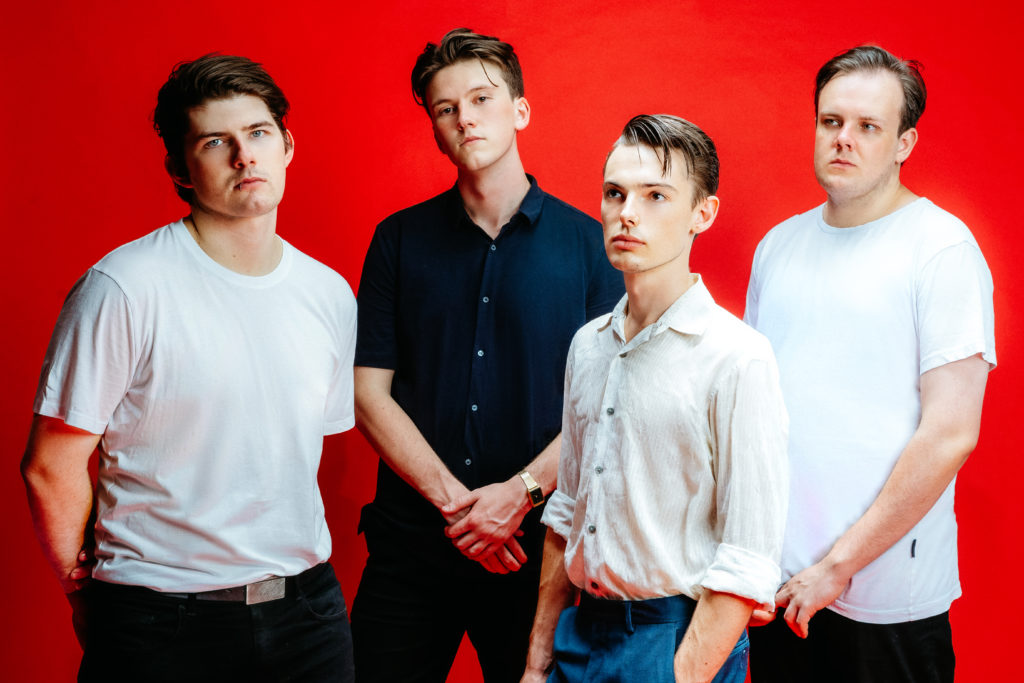
Do you think Stevie helped with you not overlayering or overstacking?
I think Stevie as a producer, he is in a band himself and it’s full raw, emotional rock. They’re a three-piece [band]. I think he tries to project that style onto the bands that accept it. We were very much about that. We didn’t want this really overproduced, hundreds of layers stacked on top each other [song] that we couldn’t play live kind of vibe. He pushed us towards it. A lot of the times we would be adding layers, we would be like ‘oh do we need a lead here? Is it too empty?’ and he would be like, ‘no man, it’s good’.
Sometimes it’s good just to have that one solid vocal and a good progression and drum beat. I think this song particularly shows it. The verses of this song are some of my favourite parts on the EP. I really like how driving it is and it’s just so simple. It’s just one chord progression and a vocal and the drums, and I think that’s a good thing.
Why do you think listeners will receive the simplicity so well?
Maybe it’s over saturation. Even for our old band, we would just try put in as much as we could. We would think ‘more is more. If you’ve got all these layers it sounds more professional’. At the end of the day [though], if a song’s going to be good, and this is something that Stevie’s always said to us; that if a song’s going to be good, it should be good with just the guitar or just the piano and a vocal. It should hold its own. It doesn’t need to have harmonies and all the point stuff. Obviously, it’s a good thing to have tastefully, but I think it makes it relatable if a song is emotionally open lyrically and also if the song’s instrumentals are easy to understand and straight up.
The band still leaves room to use outward sonics with the atmos effects at the beginning of the track.
Can you talk about the thought and representing the commotion of the world through the atmos?
The very first lyric of the song is painting a picture of me walking through a busy street. Even though I don’t know these people, I’m looking at them and wondering what they’re good at. I wonder if I’m better than them at that thing even though I’ve never met them. That sample of the busy crowd at the start was just a lead in to that. We just like the sound of it. It’s just announcing. It was just a nice ambiance, atmospheric thing to put at the start that set the vibe. The song’s very driven and it’s a walking pace song. You could picture yourself walking through the crowd at an upbeat tempo. It was just to emphasise that point.
So, for ‘Torn in Two’ how was the writing process, because the lyrics are quite heavy and poetic?
For me, funnily, the lyrics are probably the part that take the least [time] because I’m talking about something that’s so emotionally open and it kind of feels natural. Every lyricist and songwriter has a different way of approaching writing. There’s this balance between writing lyrics that are easy to understand but they’re also clever. You don’t want to just write a song that, it might have a good meaning, but it’s just black and white and doesn’t have any emotional depth to it.
When I would write lyrics, Stevie would always say to me ‘go home, you’ve got the melody for this song you’ve worked on. Just write the lyrics’. I would do nothing the whole week because I wasn’t in the write space to do it. Then, I would get to the studio on a Wednesday night and we’d have four hours. Stevie would ask ‘what do you have?’ and I would tell him nothing. He would say to me, ‘what do you mean?’, but I’m like ‘give me half an hour’. I just went into another room that was completely silent and I had this melody in my head that just came really naturally. I could sit down and write a song of lyrics in about half an hour. Generally, the best parts of the lyrics came very naturally.
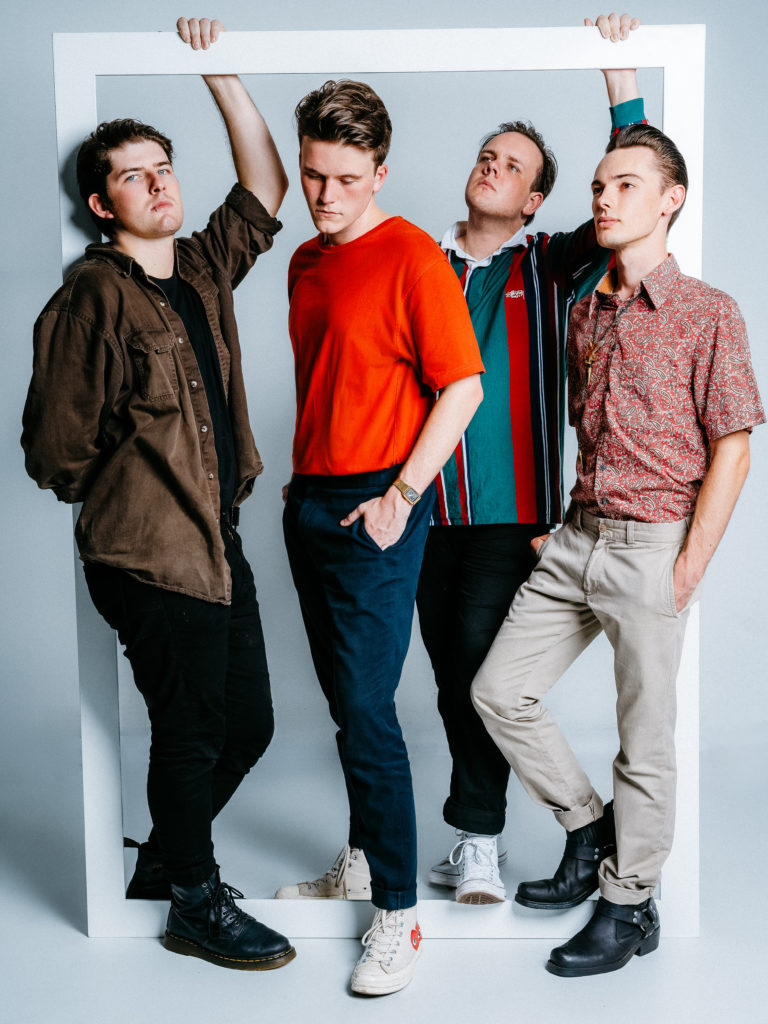
Do you think the physical space and being isolated with your thoughts also contributed and impacted on your writing ability?
I think so, definitely. What I’ve learned from writing a decent amount of songs is that when I sit there, and I have the song completely instrumentally written out, and I just put it on loop, I never could write anything. It’s so hard to sit there and just have a chorus on repeat, and try and write something to it. I never could do it. Being in a silent room where all I could hear is my voice. I would half hum the chorus and write to that, that was the environment that worked. Being alone and just me maybe made it a bit more open and more raw, but I don’t know if it was intentional. I think I just liked being in that room.
The group uses their idiosyncrasies to be put forward lyrics like ‘sinking in impulsive greed’, then juxtapose it with a jovial beat.
What was the purpose of sculpting it that way?
I think it’s funny because being in a pop-punk band before, you’re always inclined to write lyrics like that. They’re meant to be relatable and I think a lot of people go through similar. It’s not like I’m saying my outlook on life is unique. I know a lot of people that share the same viewpoint. At the end of the day, I wasn’t just going to write a song that was upbeat and just for [the purpose of] ‘okay let’s dance’. I wanted it to have a meaning. For me as a songwriter, it might seem a bit morbid or sadist to say that I always lend myself to writing that way. Maybe I was in a bad place. Not to the point where I was depressed or anything, but I was coming to a point in my life where I was realising all these things that I could see were wrong with my mindset and my outlook on life.
Once I wrote the first song on the EP, I was like, ‘okay this is what I want the direction of the EP to take’. The instrumentals would come later for ‘Torn in Two’. It ended up being upbeat, but I just still wanted it to have that theme throughout it. It wasn’t forced in any way. I think it felt very natural. I think the contrast is a sonic reflection of the metaphor behind the song and how it’s torn in two. You’re torn in two in that you’re taking away from the population, like you’re a separate thing. I kind of like the balance to be honest.
The upbeat nature also plays into the message of the song as you sing ‘we learn from defeat’, so in a way it foreshadows the little inkling of hope.
Yeah, it’s like a point of recognising that it’s not all bad. I think the whole point of that song and the EP was learning from defeat. I think this song and ‘Headspace’ particularly were the two songs that shaped the direction I wanted to go.
When your three other bandmates hear such emotive lyrics, how is their reaction and feedback?
Musical feedback is one thing and it’s hard for some people to take at first. When someone comes in and they’ve heard a great chord progression and you’re like ‘ah, it’s alright’, they kind of cut down a bit. At the end of the day, it’s something that’s subjective. You look at it and its just music and anyone can interpret it differently. With lyrics and especially with lyrics that I write that are so emotionally forward, I think the boys find it hard to say, ‘that lyric’s not very good’ or ‘I don’t like it’.
I think the whole lyric process was one sided. In saying that, every time I would write a song and be in the studio writing those lyrics and then I would come in and the guys and Stevie would ask ‘so, what have you written?’ I would go and sing the song. I always dreaded that Stevie would ask what the song’s about. He wouldn’t just settle for ‘it’s just me comparing myself to other people’. He’d want the full in-depth part. I’m naturally a shy-ish person in terms of showing people anything I do creatively. Lyrics was one of the things I was really nervous about speaking openly about it. The first time I did it, I was like ‘I don’t really want to talk about it’, and Stevie was like ‘no you have to tell me’.
When the band gets a grasp of the direction of the song, it helps everyone in the room see where you’re going lyrically. Once I’d explained it, a few times the boys would say ‘I think that lyric’s a little bit cringey or could have a bit more depth to it’. I don’t think they would ever be emotionally relating to it and being like ‘oh I felt that moment there’.
I think me as a person, I’m not very emotionally forward. I’m not going to go up to someone and say ‘I feel really sad today man’. I kind of just bottle it up or keep it inside. Not in an unhealthy way, but I think that’s just the way I deal with it. They’ve all known me for a long time. I think they all respect that and know that and take what I say as truth and they believe it.
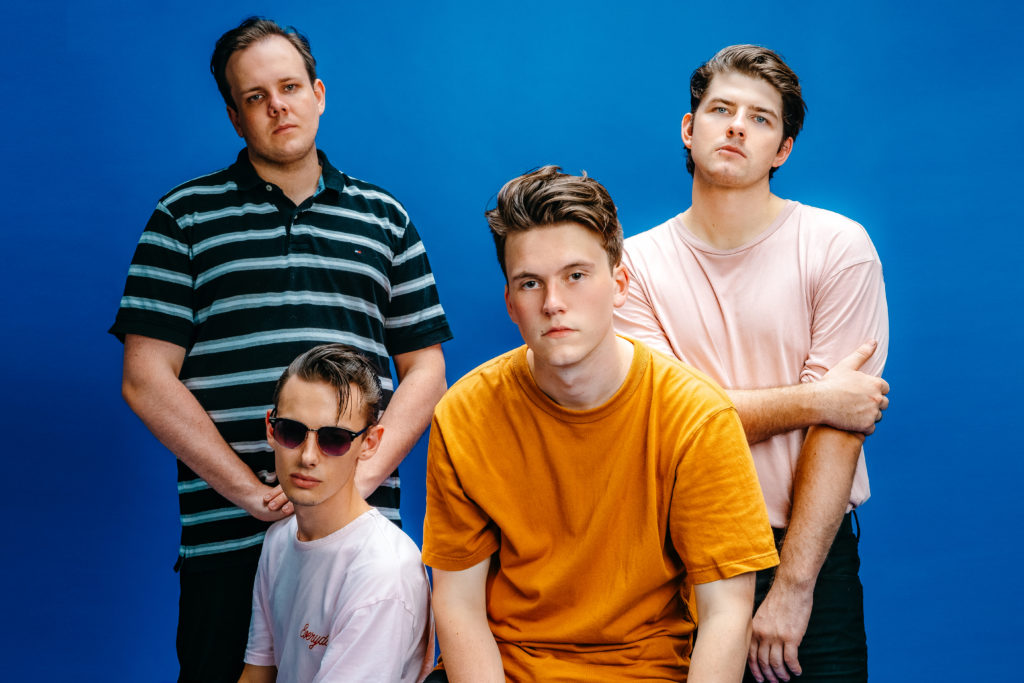
Do you think ‘Torn in Two’ has helped you tap into your emotions a little bit better?
Has it made it easier to talk about feelings outside of song-writing?
Yeah, I guess so. I think the whole thing in general, like every time I had to explain a song, there wasn’t just a vibe. We had about 8 in the works. Every time I had to explain a song it become easier. Now we’re at a polar opposite where I can sit on the phone with someone I’ve never met before and explain a song which is going to be read by a lot of people. I think I’ve just grown to accept it and it’s fine. It was more about overall, just being happy to show people what we’re doing. I think with my last band, pop-punk as a genre wasn’t a mainstream thing. You would show people, and people that I work with would be like, ‘show me your band’, and I would say, ‘uh, you wouldn’t like it… it’s not your thing, trust me’.
That mindset put me off showing people my old band, unless I knew they would genuinely like it. Now that I’ve gotten past that… now I’ll happily show people my band and [say], ‘yeah, I’m really happy with this song, you should look at it’. It’s refreshing, but it’s something that is very new for me. I think writing ‘Torn in Two’ and the whole EP definitely helped me in that way. I’m definitely more open about it all.
How do the rest of the songs on the EP explore potentially similar or different themes?
The whole EP has a similar theme in that it’s about the recognition of my mistakes, or my bad personality traits. With this EP, all the songs sound a little different. ‘Headspace’ is very synth heavy and more of a dance, retro vibe. ‘Torn in Two’ is an upbeat, jovial, dancey kind of song. Without giving too much away, the next single is very dramatic and has piano and has a lot of build into it.
There’s another song that has Americana. It’s stripped back, but it’s got this Americana, Malibu-like vibe. It was weird, when I was writing, I had a lot of inspiration in writing in that style and I got pushed away from it a lot. It’s a good thing now, but there’s a song [on the EP] where I just had this weird American thing going. Not as an accent, but you’ll see when it comes out. It’s the last track on the EP and it’s probably my favourite song. It’s just not a single song. You know how there’s songs on an album that are killer, but they’re just not single songs? Yeah.
Then another song, it’s probably really close to [the songs in our band before], because it was the one we wrote closest to when we were transitioning as a band. I think it was the first or second one we wrote. Lyrically all of the verses have a similar feel to the rest of the EP. We have this chorus that just stuck out from the rest of the EP and we actually changed that entire chorus with Dave in the last writing session. I don’t know, it fits now, but I’d say it’s my least favourite. I feel like it’s going to be a dark horse. People are going to listen and be like, ‘it’s a really good song’. Maybe I have a weird mindset because I’ve heard it so many different ways.
There is plenty to expect from Sinclaire. In this day and age, their brand of music gives us much to ponder about our own harmful habits. ‘Torn in Two’ invites listeners to reflect on countering falling victim to their loud, internal thoughts. Michael concludes by saying, ‘I always want to be open about a part of it… I think it makes it more relatable… being brutally honest with myself’. There’s no doubt that Sinclaire hopes to advocate accountability and openness to forge connections with new listeners.
FOLLOW SINCLAIRE